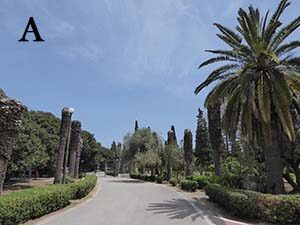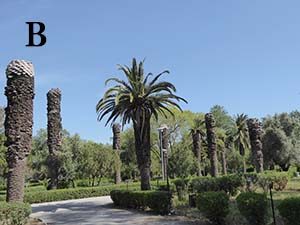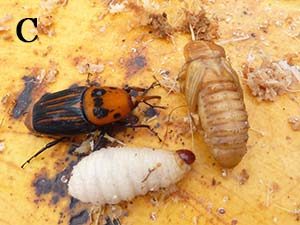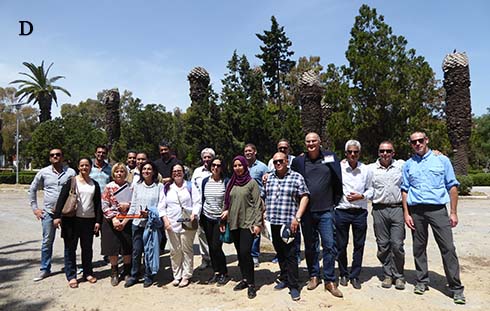
|
Written by: Mark Hoddle Email: mark.hoddle@ucr.edu |

The red palm weevil (RPW), Rhynchophorus ferrugineus, is a highly invasive and extremely damaging pests of palms, especially ornamental Canary Islands date palms (Phoenix canariensis) (CIDP’s), and date palms (Phoenix dactylifera) that produce fruit for human consumption.
RPW is native to southeast Asia where it is a well-recognized pest of coconut palms. Movement of live palms for landscaping (e.g., beautifying new hotels and tourist resort areas with coconut and date palms) has resulted in the inadvertent introduction of this pest into areas outside of its home range.

Regions that have been particularly devastated by the RPW invasion are Mediterranean countries (e.g., Italy, France, Spain, and Portugal where thousands of CIDPs have been killed), the Middle East (e.g., Egypt, Israel, Saudi Arabia, and the United Arab Emirates), and the Maghreb region of northwest Africa (e.g., Morocco, Tunisia, and Libya) where date palms and ornamental CIDP’s have been hard hit.
The threat RPW poses to date palms in the Middle East and northern Africa is immense and weevil attacks have possibly killed millions of date palms (unverified estimates from Egypt alone suggest that more than 1 million date palms have been killed by RPW) threatening a very important agricultural crop that has extremely high religious and cultural significance. The magnitude of this problem is of high concern in these regions and RPW is the focus of FAO missions that aim to develop control programs by training local staff on RPW management. Many of these FAO led missions appear to have been successful to varying degrees, but one program in particular stands out, it is appearing to be highly likely that in Mauritania RPW may be on the verge of eradication. RPW has been eradicated in the Canary Islands after an intensive management campaign, and a closely related palm weevil, R. vulneratus, also native to southeast Asia, was recently eradicated from California (Hoddle et al. 2017).

In 2011, RPW was recorded in Tunisia killing CIDP’s in the northern cities of Tunis and Carthage. Management efforts have so far contained this pest in the north of Tunisia but infested areas are increasing.
Because of this ongoing spread and spectacular levels of palm mortality caused by RPW, this invasion is of high concern to the USA. Opening remarks made by Mr. Benjamin Moeling, Deputy Chief of Mission for the US Embassy in Tunis Tunisia at the recent International Conference on the Red Palm Weevil in Tunisia (3-5 May 2017) made it clear that the potential disruption to date production may cause a fragile political structure to collapse should RPW establish in the southern oases (Gafsa, Tozeur, Gabés, and Kébili) where dates are produced. The reason for this concern is potential economic, social, political, and food insecurity and consequently this is of high strategic interest to the US which views the RPW invasion as a national security issue in part of a much larger geopolitical area that is currently experiencing high political and social disruption.
The following statistics make it clear what is at risk from the RPW invasion. In 2016, 54,000 hectares of land was devoted to date production in Tunisia and exported dates were worth ~$207 million (US). Dates in Tunisia account for ~4% of global production, and an impressive 24% of global date revenue because of the high quality of this premium fruit. Dates account for 12% of agricultural exports from Tunisia (about 5% of exported dates are marketed in the USA) which makes up about 6% of agricultural production. Date farming is typically a small family run operation in Tunisia. There are an estimated 50,000 date growers farming plots that are ~ 0.85 hectare/producer. Harvested dates are managed by around 400 collection agencies, who pass this produce onto 72 exporters.
Date production in Tunisia is a high value agriculture enterprise that employs a lot of people in a country that in January 2017 had an estimated unemployment rate of ~15%. RPW has the capability of greatly reducing the long term viability of the iconic Tunisian date industry which could cause economic, political, and social instability in an area of Tunisia where the population is highly reliant on dates for their livelihoods and daily diet.
In response to this RPW invasion, the US Embassy sponsored a three day event, the International Conference on the Red Palm Weevil in Tunisia (3-5 May 2017). The conference had palm weevil experts from UC Riverside, Tunisia, FAO, France, India, Costa Rica, and Saudi Arabia who delivered talks over a two period on various aspects of date production, RPW biology, behavior, invasion ecology, and management. The third day of the conference was a RPW monitoring training day in La Mersa in Tunis an area with very high numbers of dead and dying CIPD’s. The field day was devoted to discussing and demonstrating pheromone-based trapping programs, management of trap data, and emerging technologies such as “attract and kill” that support traditional pesticide applications to palms for RPW population suppression. The aim of this US-sponsored event was to assist Tunisian officials and RPW management teams with the development of containment and management programs to restrain populations in the north of Tunisia thereby preventing or greatly slowing the spread of this pest into date production areas 500 kilometers to the south. The ultimate goal of RPW management programs in is the eradication of RPW from northern Tunisia.
Conference Speakers and Presentations
Session 1. Overview of RPW in Tunisia: Containment, Control, and Eradication Efforts
1) Dorsaf Ben Ahmad Zaag, Directorate General for Agricultural Production, Tunis: The Economic Importance of Date Production in Tunisia
2) Mohamed Habib Dhouibi. Department of Entomology, National Institute of Agronomy, Tunis: The Major Pests of Date Palms in Tunisia and Research on Red Palm Weevil
3) Fetuhia Hellali, General Directorate of Protection and Control of the Quality of Agricultural Products, Ministry of Agriculture, Water Resources, and Fisheries, Tunis: Strategies Adopted to Control Red Palm Weevil in Tunisia.
Session 2: Overview of the Biology, Ecology, Behavior, Distribution, and Invasion History of Red Palm Weevil
4) Mark Hoddle, Department of Entomology, University of California, Riverside: Overview of the Biology, Ecology, Behavior, Distribution, and Invasion History of Red Palm Weevil.
5) Paul Rugman-Jones, Department of Entomology, University of California, Riverside: Identity, Phylogeny, and Invasion History of Red Palm Weevil
Session 3: Discovery of Palm Weevil Aggregation Pheromones and their Use in Pest Management
6) Cam Oehlschlager, CEO ChemTica International, Costa Rica: Discovery of Palm Weevil Aggregation Pheromones and their Use in Pest Management
7) Didier Rochat, Institute of Ecology and Environmental Sciences, Paris France: Synergists for Optimal Trapping of Red Palm Weevil Using Aggregation Pheromone
Session 4: Area-Wide Management Programs for Red Palm Weevils
8) Hamadttu El-Shafie, The Date Palm Research Center of Excellence, King Faisal University, Al Ahsaa, Kingdom of Saudi Arabia: Lessons Learned from the Experiences of Managing Red Palm Weevil in Saudi Arabia
9) Romeno Faleiro, FAO Goa India: Management of Red Palm Weevil: Development and Implementation of Small to Large-Scale Control Programs
Session 5: Future Directions and Emerging New Technologies for Red Palm Weevil Control
Agenor Mafra-Neto, ISCA Technologies, Riverside California: The Future of Red Palm Weevil Control in Tunisia: From Management to Eradication

References Cited:
Hoddle, M.S., C.D. Hoddle, M. Alzubaidy, J. Kabashima, J.N. Nisson, J. Millar, and M. Dimson. 2017. Rhynchophorus vulneratus palm weevil is eradicated from Laguna Beach. Cal. Ag. 71: 23-29.
